

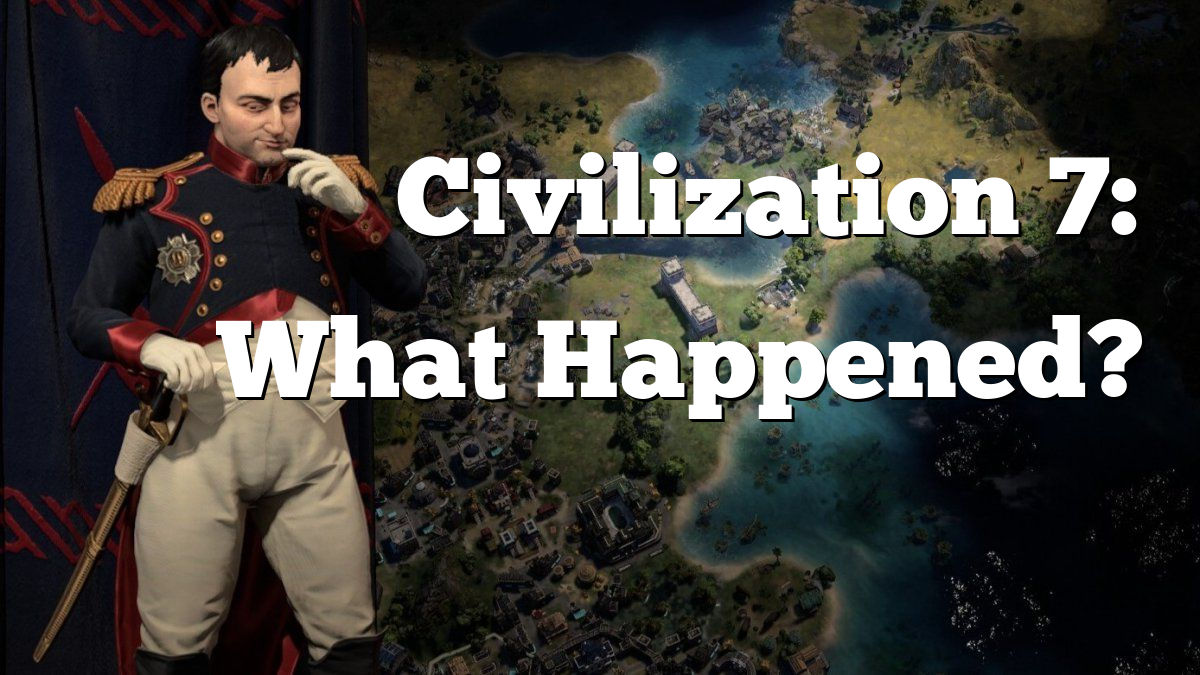
Civilization 7 YouTube Videos Playlist
The Civilization series has produced arguably the most successful and prestigious turn-based strategy games of all time. Ever since the initial Civilization game released back in 1991, this has been the series that all of the other empire-building games have strived to imitate. New Civ games don't come out that often and there had been a particularly long wait of eight and a half years between Civ6's debut in 2016 and the announcement that Civ7 would be releasing in February 2025. This was a strange time to release a flagship PC game, since the February-April period is typically seen as the deadest part of the calendar in terms of sales, however everyone was so excited at the prospect of another new Civ game that it didn't attract much attention. The updated visuals looked fantastic in teaser screenshots and the gaming press did its typical job of hyping Civ7 during the months leading up to release. After all, this was the rare arrival of a new game in the Civilization series, the gold standard of strategy games that literally everyone knows about and has likely tried at some point. And yes, some of the recent releases from developer Firaxis Games like XCOM: Chimera Squad and Midnight Suns had been underwhelming from both a critical and commercial perspective, but they'd had eight full years to work on Civ7 since the last Civilization game came out. Surely there couldn't be a *BAD* Civilization game, right?
Right? 
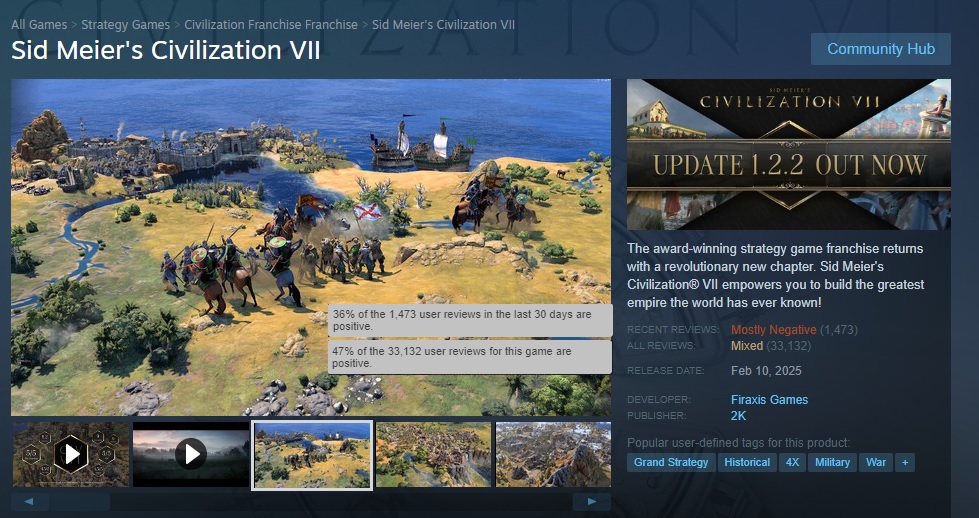
When Civ7 officially released in early 2025 (using a staggered unlock date that gave earlier access to players who purchased the more expensive editions), the initial reaction was one of shocked disappointment. While the game received sycophantic praise from several strategy game YouTubers, many of whom it later came out had been paid by publisher Take-Two Games to provide positive reviews, the reception from everyone else was much less wholesome. Most of the traditional gaming media awarded Civ7 scores around 80%, something which might sound good until remembering that these website always grade big budget releases on a steep curve. Gaming website are extremely hesitant to criticize flagship titles from big publishers, due to their reliance on getting insider access and early information from those same publishers, and therefore always treat these games with kid gloves. With that in mind, scores like 76 from PC Gamer and 70 from IGN and an eye-popping 2/5 stars from Eurogamer were flashing warning signs. For those who could read between the lines, this was an indication that the traditional gaming media knew that Civ7 had major problems but couldn't say so without burning their relationship with Take-Two Games.
Civ7 was therefore far from a critical darling but there are always plenty of games that reviewers dislike while players love. Was this simply a case of the formal reviewers having their noses stuck too far up their posteriors? Far from it: the reception from fans was much, much worse than from the official reviewers. I highlighted the Steam reviews above which started out at the "mixed" level and grew worse and worse over time. At the time of this writing, only 47% of Steam reviewers rated Civ7 positively while the recent reviews had dipped significantly worse down to 36% positive. Those are exceptionally bad scores for Steam reviews; I did a quick check of the 100 most-played games on Steam and only the infamously bad Overwatch 2 had a lower user score than Civ7. Note that Steam only allows reviews from individuals who have purchased the game in question so this wasn't the case of a movie or TV show getting review bombed by an unrelated Internet troll army. These terrible user reviews weren't limited to Steam either, as the user reviews for Civ7 on Metacritic currently sit at 3.8 out of 10, vastly lower than every previous game in the Civilization series (which all sit around 7.5 to 8.5). Even the console versions of Civ7 have equally awful scores from users, with the game sitting at a rating of 2.5 out of 5 on the XBox store and 2.73 out of 5 on the Playstation store. Those are atrociously bad scores, the kind commonly given to bargain basement shovelware games, not venerated historic franchises.
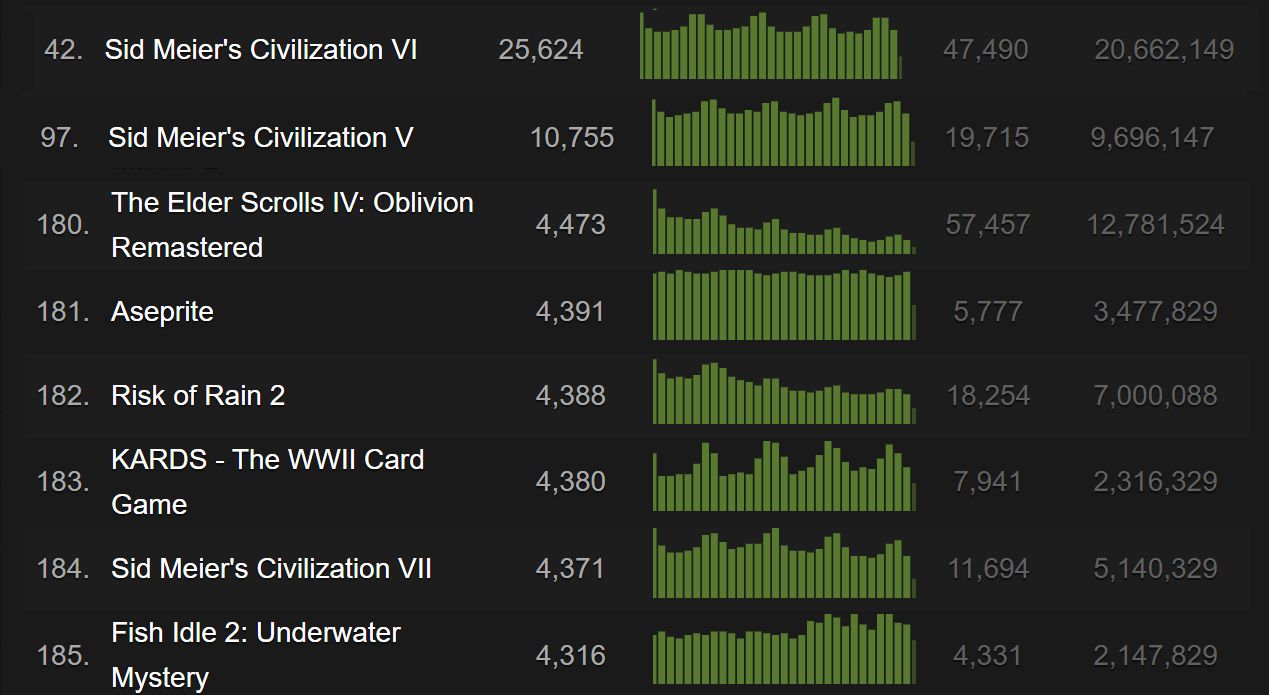
The visceral negative reaction from players quickly manifested itself in a cratered player count as well. Thanks to the tracking data at SteamCharts, everyone could follow along with the performance of Civ7 and see how popular it proved to be during the months following release. There was an initial spike for Civ7 on the day of release followed by a huge plunge afterwards as the excitement of the launch wore off. Now this is nothing unusual as virtually every game follows the same pattern, just like new movies and new television releases, however Civ7 was noteworthy for the speed and steepness of that drop from the initial high point. Within a few days Civ7's player count had fallen below Civ6 and it continued going down with no sign of abating. By the end of March, the active users for Civ7 were approaching the active users for Civ5, a game that came out 15 years earlier and hadn't had any new content released for a full decade. The crossover took place at the start of April and ever since then Civ5 has been drawing more players than Civ7. I grabbed the tracking data above while writing this article which tells the grim tale: Civ6 is currently drawing 5x to 6x the player numbers of Civ7 while even the antiquated Civ5 draws roughly 2.5x as many players. Civ7 is barely managing triple the player count of Civ4 (!) which came out 20 years earlier and wasn't even released on Steam until after the vast majority of its players already owned it.
These truly dismal numbers are reflected in the peer games that occupy the same part of the SteamCharts list as Civ7. When I grabbed the screenshot above, Civ6 was sitting in 42nd place in terms of Steam players while the grizzled old Civ5 was understandably much further down the list in 97th place. The newly released Civ7, which had been out for just over four months, couldn't do better than 184th place for its player count where it sat next to gaming luminaries like KARDS: The World War II Card Game and Fish Idle 2: Underwater Mystery. Then I thought that I'd look at Steam's Top Sellers list, as maybe Civ7 was actually selling well even if it didn't have a lot of active players at the moment. That comparison was no better either: Civ7 was sitting in 151st place on the Top Sellers chart, more than 30 spots below Civ6 and nowhere even remotely close to the popular games at the top. Civ7 was sitting next to a Smash Brothers knockoff game named Brawlhalla from 2017 and something called Project Zomboid from 2013. Somehow I doubt this was what Firaxis and Take-Two were anticipating when they launched Civ7 a few months earlier.
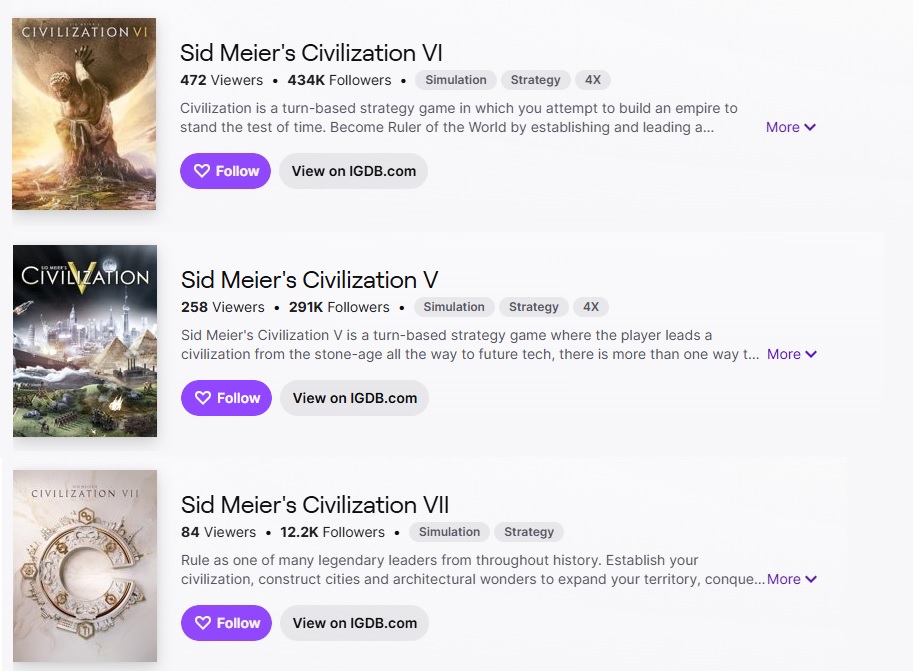
Civ7 is also noteworthy for having virtually no presence whatosever on social media. After the initial burst of interest, Civ7 simply disappeared from any discussion on Reddit outside of the narrow Civilization community. Strategy game YouTubers ditched the game en masse after a few weeks, many of them plainly stating that they were drawing more viewers from going back to Civ6 or swiching to other non-Firaxis titles rather than continuing to feature Civ7. (Good thing a bunch of them lit their credibility on fire with those earlier fawning reviews, huh?) I observed this reaction myself as the Civ7 videos that I put on YouTube were significantly less popular than pretty much any other strategy games that I've featured there. I pulled the current Twitch numbers for Livestreaming viewship above where, once again, Civ6 draws an audience roughly 5-6 times the size of Civ7. Even Civ5 continues to outdraw Civ7 content on Livestream, and if anything this snapshot comparison was taken at a moment favorable to Civ7 since the game typically had around 50 viewers when I checked several times earlier. Turn-based strategy games aren't exactly the most popular genre for watching live, but even with that in mind, if Civ7 can't consistently approach even 100 viewers a few months after release, it's a dire sign for its future prospects. Heck, I outdraw those numbers solely with my own Livestream and I'm not that popular! 
There's a contingent of posters at CivFanatics who remain in denial over how poorly things have gone for Civ7. Some of them have floated elaborate theories of massive sales for the console versions of Civ7 which account for the Steam numbers being so low. There's essentially no evidence to support a massive player migration over to consoles, platforms which are poorly suited for empire-building strategy games and which have no history of large sales for this genre. Given the low number of user reviews for Civ7 on these platforms and the game's failure to appear in any of the top seller lists that they occasionally release, I think it's safe to assume that there's no secret contingent of console Civ7 fans hiding out there. We also have further evidence that Civ7 has badly fallen below expectations from the Take-Two earnings call that took place in May, where this was the entire statement issued about Civ7:
During the period, 2K released Sid Meier's Civilization VII - the revolutionary new chapter in our esteemed strategy franchise. As stewards of the Civilization series, Firaxis Games strive to bring innovation with each new release. We're confident that the development team's ongoing efforts to update key areas of the game will deliver outstanding results over the franchise's typically long sales cycle. Our teams are pursuing opportunities to expand the audience, including the recent launch of Civilization VII VR for Meta Quest 3 and 3S, as well as the title's upcoming release on Switch 2, which will offer new mouse controls for a highly intuitive game experience.
And that was it. Any time that a publisher is advertising "ongoing efforts to update key areas" and pointing to "the franchise's typically long sales cycle", that's a flashing warning sign about how things are going. In comparison to Civ7, every other title on the investor call (including other new releases from the same period) was covered with either concrete numbers tied to sales and engagement, or was accompanied by a general comment stating that the title met or exceeded expectations. Amidst all of that, Civ 7's lack of coverage stands out: "the silence is deafening" as the old saying goes. It's beyond obvious that Civ7 simply is not popular and has sold poorly after the initial launch window. And the more that players have experienced Civ7's gameplay, the less that they seem to enjoy it. It's a stunning fall from grace for one of the most beloved series in gaming history and one that has been an important part of my own life for the last few decades.
It all begs the questions: what happened? How did it all go so wrong? And is there any way that Civ7 can recover from here? I'll do my best to address those topics in the rest of this article, but first, I think we need to understand what it was that the developers were trying to accomplish in Civ7. We can't figure out how the whole structure collapsed without first covering what the architects were trying to build. So let's start our examination of Civ7 by looking at...
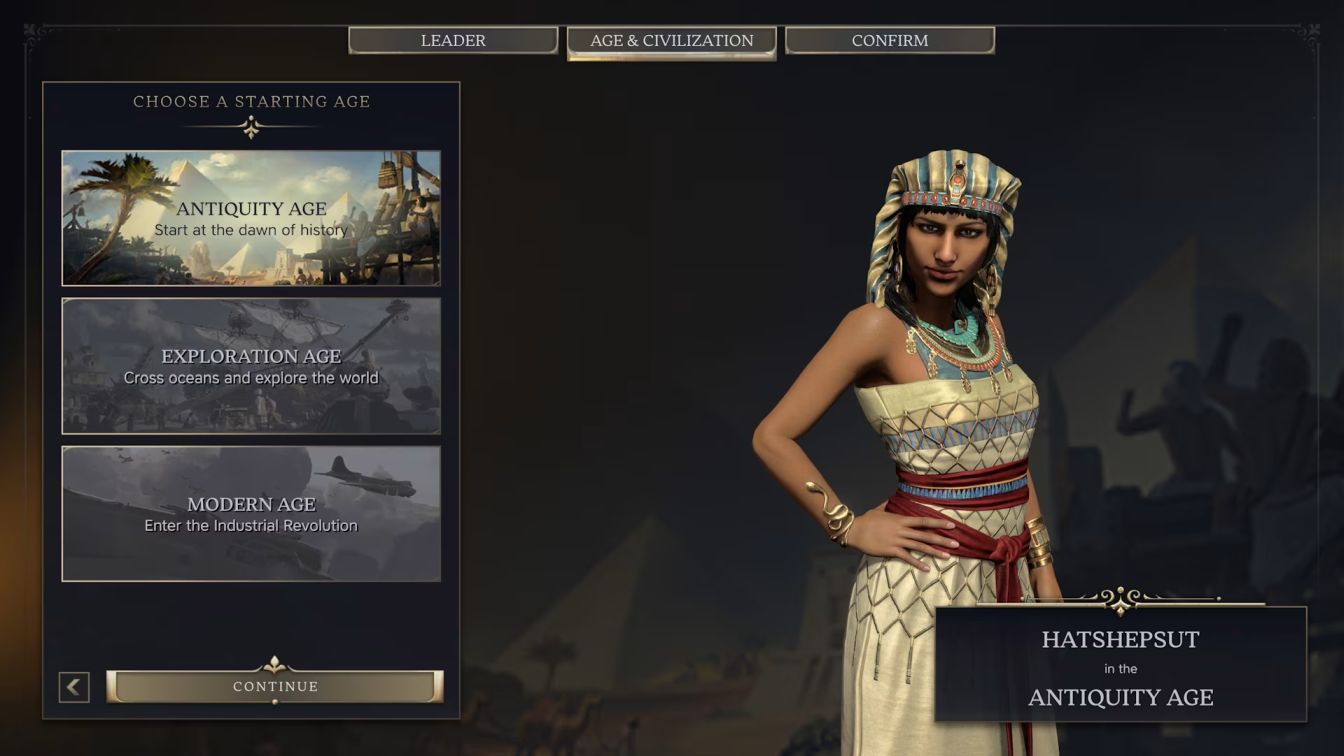
One helpful resource provided by the developers at Firaxis was a series of dev diaries that came out in the months preceding Civ7's release. While these were of course intended to help build community hype over the upcoming launch, they're also a fascinating look into the mindset of the team responsible for crafting this latest entry in the series. The most important of these was the very first dev diary to be released, the one focused on Ages that I've linked above. This article specifically addressed why the design team made the fateful decision to split Civ7's gameplay into three distinct ages which has proven to be the most controversial aspect of the gameplay. In the words of Creative Director Ed Beach, the overall head of the Civ7 team, ages were intended to be a response to a fundamental problem: late-game Civilization is just not that fun to play. The designers identified three main root causes:
* Snowballing. Snowballing refers to when you start with something small, it gathers momentum, and then it becomes unstoppable. In Civ, this is expressed when your empire advances too fast for your opponents to catch up, or you've fallen behind so far that you can't catch up. In both scenarios, your choices and decisions have little effect on the ultimate outcome.
* Lots of micromanagement. Civilization, like many 4X games, can be mapped onto a simple linear graph - as time increases, the amount of actions you have to take increases. This is manageable in the first few hours - what many players feel is the most fun - where you have a few cities, some builders, and a small army. But the more you play, the bigger your empire gets, and suddenly you are making decisions for dozens of cities, moving dozens of units one by one, etc. This is both tedious to the player and makes every decision feel less important.
* Civ balancing. Civ designs draw inspiration from historical events and cultures, so their unique abilities, units, and buildings must be both relevant to their identity while also being balanced across a game that spans all of history. Because of this, every civ is strong at a particular point in the game, but can be generic during other points. What's interesting is that due to snowballing, competitive Civ players rarely pick late-game civs, because by the time those abilities and units come online, someone has built up an insurmountable lead.
These are just a few of the things the team identified, and the ultimate kicker is how they express themselves in a single data point: more than half of the Civilization VI players have never finished a single campaign! Now, we have heard from some members of the community who wonder - is this actually an issue that needs solving? If players are having fun in Civ with the way it's currently built, what's the problem? From our perspective, not finishing the game is a signal that players are hitting points where they're no longer having fun. We want everyone to have a great experience from start to finish. We know that players often feel the beginning hours of Civ are magical, and we want to make sure that every part of the game feels just as epic and exciting as that initial rush.
To the credit of Ed Beach and his team, these are legitimate criticisms of Civilization's gameplay. Empire-building strategy games have always been susceptible to one player snowballing ahead and becoming the Runaway Civ that simply becomes unstoppable over time. These game are similarly notorious for overloading on micromanagement as the gameplay continues, and I fully support the notion of gameplay changes to cut down on micromanagement tedium as time passes. The Civilization series has mostly done a good job of improving at this over time, with the glaring exception of the One Unit Per Tile rules adopted in Civ5 making combat significantly slower as opposed to being able to stack and move large numbers of units together. I'm less concerned about balancing having been a problem in prior Civ games, and if anything some of the worst culprits were the downloadable civs from Civ6 which were clearly released in an overpowered state to drive sales, but sure, why not. Balancing is of course important and it can be tough to strike the right mixture between an early game civ like Egypt and a late game civ like America.
These goals were therefore laudable and I don't fault the developers at all for trying to make improvements in these areas. Unfortunately, the solutions that they came up with proved to be much, much worse than the problems they were trying to solve. Here's Ed Beach again explaining the concept of ages:
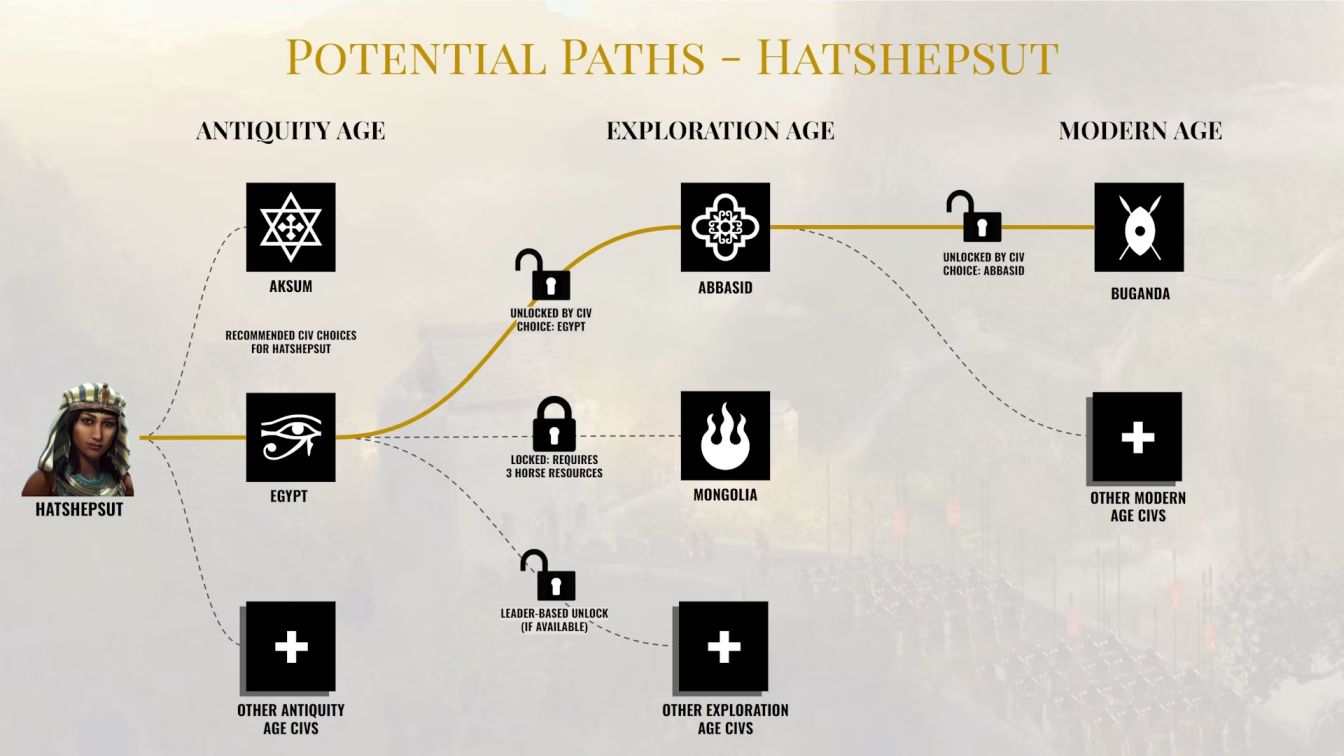
So with this issue in mind, along with the insight that "history is built in layers" that we've previously outlined, we decided that the best way to tackle these challenges is to break the game up into historically-themed chapters. A useful analogy for thinking about this structure is a book series: each Age has a story of its own with a beginning, middle, and end. When the books are combined together, they tell the full, epic story of your empire. Age Progress determines how far along you are in that Age. Every turn contributes a small amount of Age Progress, while completing things like milestones along a Legacy Path will contribute larger amounts to the Age Progress meter. Generally speaking, you can expect an Age to last around 150 to 200 turns on standard speed, or roughly three to four hours of play.
Regarding the aforementioned Legacy Paths, these are a series of objectives for you to complete during an Age, categorized as Science, Military, Culture, and Economy objectives. Every Legacy Path contains several milestones, providing you with greater rewards as you progress further down a given path. Each new reward unlocks one or more bonuses that you can take advantage of during the transition into the next Age. Completing a Legacy Path in its entirety unlocks a Golden Age Legacy that you'll have access to in the next Age; failing to complete even one milestone of a Legacy Path gives you an associated Dark Age Legacy. Every path and its objectives are themed to the Age, further bringing out the essence of that time period.
As you near the end of an Age, you'll be confronted with a Crisis. As the name suggests, Crises are something all civilizations in the game must face and navigate, and are themed to the Age. Every Crisis comes in stages and intensifies over time, making it more challenging to maintain your empire if you don't adapt. In addition to gameplay moments, you'll have to select which Crisis Policies you want to take on. In contrast to the beneficial social policies you slot in when completing Civics, Crisis Policies are negative ones that are slotted into their own separate set. There's several reasons why we created the Crisis system. First, they add a jolt of variety and excitement to the end of the Age, making the late game of an Age feel climatic and epic. They provide an interesting challenge for the player to navigate - there's no "right" way to adapt, adding a ton more replay value. And finally, they reflect the narrative reality of many civilizations - creation, growth, crisis, and rebirth - that leads to a reshaping of the world… and the ushering of a new Age!
The developer solution was therefore to break apart Civ7's gameplay into three distinct ages. I can see the intent of what they were going for here: by having two distinct reset points during the gameplay, the idea was that each game would remain closer and more competitive to reign in the snowballing problem. Having these age transitions would also reset the map and therefore reduce the amount of micromanagement taking place, and civ balancing could also be improved because each civ would be situated in its own distinct era. There would be no more need to worry about the Egypt vs America problem because Egypt and America would never exist in the same era. I'm sure anyone reading this can already see why this solution would be controversial and introduce its own new problems as bad or worse than the ones being solved; I only wish the developers had stopped to think this decision over a bit more!
If the Civilization gameplay was going to be split into three parts, then there had to be something bridging the gap which proved to be legacies and the crisis system. Legacies would create scoring objectives and allow the player to carry over some of their progress from one era to another; Ed Beach has a background in boardgame design and this is a classic boardgaming system. Then the crisis system would address the other side of the era split, creating a narrative reason to explain why each civilization would collapse and fall apart, only to be revived in a later era. A lot of this stuff sounds great in the abstract, or maybe something fun to experience in a one-off scenario, but was anyone really calling for chopping up the main Civilization gameplay into three separate minigames? There was a lot of discussion on what might be included in Civ7 during the long years before it was officially announced, and I can't remember anyone asking for something along these lines.
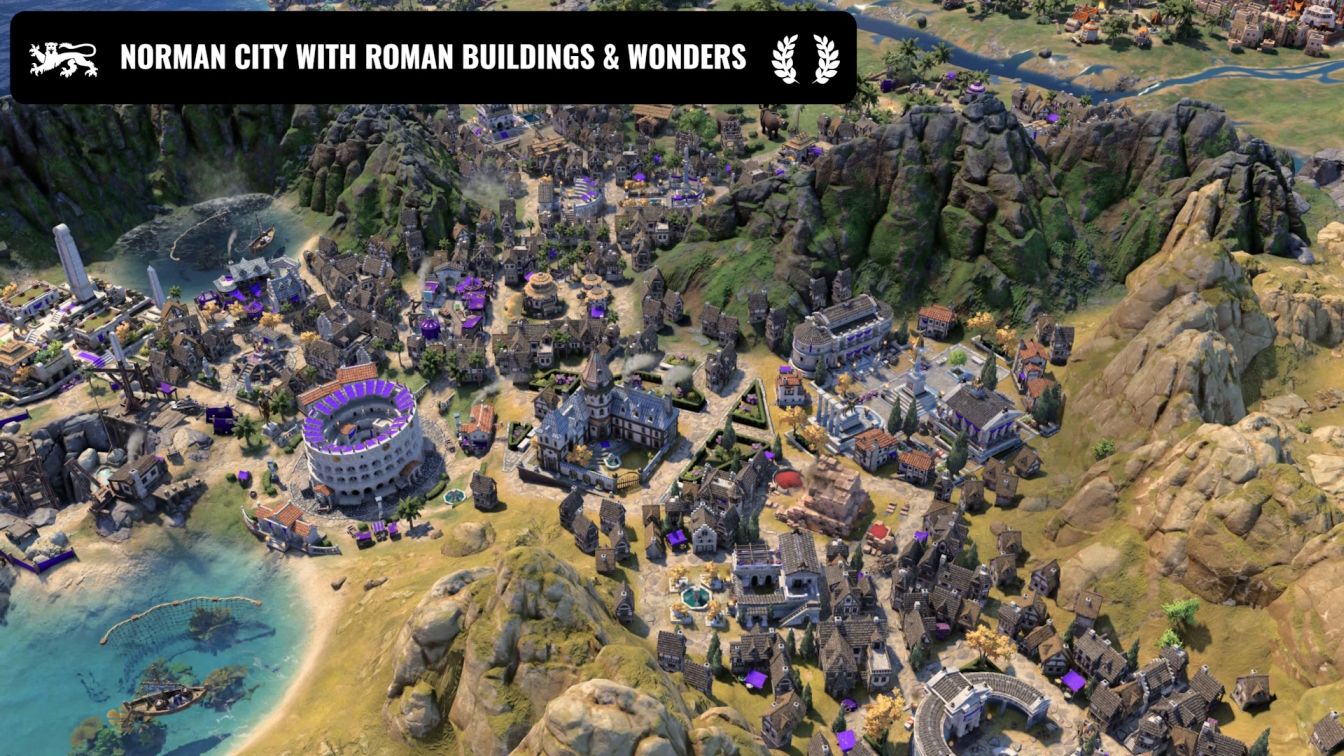
One final series of quotes from the dev diary articles:
Once you select your new civ and legacies and the new Age begins, your game world undergoes a series of changes across the board. All civilizations begin anew with an updated Civics and Technology Tree. New resources fill the map, and the world expands. From Antiquity to Exploration, you'll be able to research shipbuilding to cross great oceans and reach Distant Lands... which, it turns out, are already occupied with other undiscovered civilizations who may not welcome your presence! You'll be able to "overbuild" - construct new buildings on top of your old ones, which have reduced yields as they're less powerful in the new Age. New Legacy Paths present you with updated objectives and new game systems can come online; Religion, which plays a minor role in the Antiquity Age, becomes an essential driver of action during the Exploration Age.
As your civilization advances through the Ages, not all of your constructs will stay the same. Warehouse Buildings, Unique Buildings & Improvements, and Wonders retain their effects and continue to provide all bonuses regardless of the Age. They are tagged in the game as Ageless. These Buildings ensure that your investments carry forward through time, providing a reliable backbone to your empire's infrastructure. However, other Buildings and Improvements may eventually become outdated: they will lose their effects and adjacency bonuses, keeping only their base yields, prompting opportunities to overbuild and evolve your empire to better suit the new Age's requirements and resources. Overbuilding allows you to adapt your Cities to new challenges and opportunities as you progress through the Ages. After transitioning from one Age to the next, older structures can be replaced by new, more powerful Buildings, making sure that your empire's infrastructure always matches its needs.
Age Transitions represent moments of possibility in a game of Civilization VII. If you find yourself falling too far behind, an Age Transition will offer you a way to get back into the game. You can double down on a preferred playstyle or pivot to a completely different civ if you find yourself outmatched in certain parts of the game. Snowballing into an unstoppable juggernaut is no longer as obvious an outcome, but we want to make sure that you're still rewarded for playing well through an abundance of Legacy Points, Golden Age options, and more.
These quotes made explicit that the era transitions were designed to function as a reset button, again with the goal of stopping the classic Civilization snowball. Most of the buildings from the previous era would become obsolete and lose most of their yields while the map would also reset with new resources, new independent powers, new tech and civic trees, and so on. This was deliberately advertised as a catch-up mechanism and intended as a way to keep games closer and therefore stop players from abandoning games. (It's worth pointing out that this has been a total failure in practice, as the eras have done basically nothing to make Civ7 games closer or more competitive than earlier entries in the series. If anything, player abandonment of unfinished games is worse than ever due to the eras causing such abrupt discontinuities.) The developer solution was therefore to split the game into ages, each with their own mechanics and individual scoring goals, with crisis points dividing them. But... would these era transitions actually be fun to play? I had my doubts when I heard the initial Civ7 announcement and the released product did nothing to assuage those fears. The developer goals made sense in theory but catastrophically misunderstood how and why people play Civilization games. When players booted up Civ7 for the first time, what they encountered bore little resemblance to the lofty ambitions of the design team.

No matter what gameplay goals the developers might be trying to achieve, none of that matters if the user experience is a terrible one. And unfortunately this was precisely the first impression that players received when they booted up Civ7 for the first time, with the game launching as a buggy mess riddled with incomplete systems and contradictory text. The user interface was particularly bad and generally gave off the impression of a cheap mobile game rather than a big budget strategy title with a pricetag exceeding $100 million. Civ7 was clearly an unfinished game at the time of release which made it all the more puzzling why it was shoved out the door for a bizarre February launch window. The best guess is that Civ7 was pushed out early to make the quarterly earnings numbers look better for publisher Take-Two (which ends its fiscal year on March 31), exactly the sort of penny-wise / pound-foolish decision making that plagues corporate governance. Well, the executives juiced the revenue numbers on a temporary basis at the cost of doing permanent, lasting damage to Civ7 in the process - great job, guys. 
There really is no way to discuss the experience of playing Civ7 on launch without first covering the user interface. To say that it was atrocious is an understatement; the interface was in such poor state that at times the game was barely playable. I made a lengthy catalog of these flaws when I recorded a video of my first impressions of Civ7 which is worth running through to give a few examples. For starters, it was very difficult to distinguish terrain and my units constantly kept losing their turns because there was some tiny clump of bushes or rocks that made a tile "rough" terrain despite barely any visual indicator. Within the city building, all terrain received certain predetermined rural improvements (like forests always getting woodcutters) but the game didn't tell you what they were. Have fun trying to guess what improvement each tile will receive when playing for the first time! Rural improvements and urban buildings were extremely difficult to distinguish at a glance; mousing over them would display only a icon with *NO* text to state what building was present. Those icons all looked very similar and there was no color coding to distinguish building types. In addition, the game didn't tell you what a city finished building upon completion, and furthermore cities couldn't even be renamed! This laughably bad interface design did much to ruin what were otherwise solid city building mechanics.
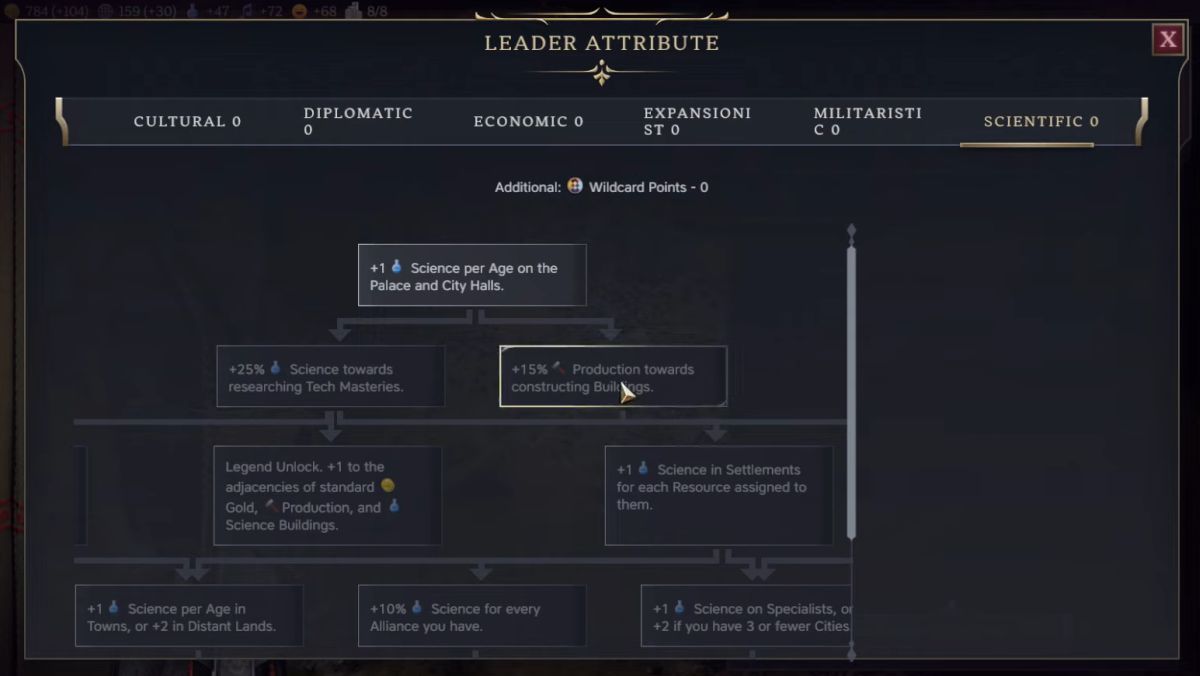
Elsewhere, the tech/civic screens looked atrocious as pictured above, and the game refused to tell the player the beakers/culture/happiness needed for anything. Enjoy navigating everything by miniature icons with no numbers attached! When it came to combat, the game refused to tell the player what abilities enemy units might having, forcing them to search in the Civilopedia for this extremely basic information. The interface also refused to list the HP for enemy units anywhere, something that still persists in Civ7 to this day. I guess you'd better memorize how much damage your archer shot does because there's no way to find out the remaining health of enemy units afterwards. Basic unit actions like fortify and heal were also hidden behind an arrow for totally inexplicable reasons while the attribute point screen had text missing off the sides for no apparent reason. I couldn't even read what some of the attribute choices were because there were no scroll bars and much of the text was cut off. On top of everything else, there were seemingly no hotkeys for anything! I guess that designing Civ7 for consoles meant that the developers didn't bother to take advantage of basic keyboard features. While some Civ7 defenders tried to brush off the interface issues, they were legitimately a huge problem; the UI was so bad that it fundamentally made it difficult to impossible to play the game at times.
As befitting its unfinished status, Civ7 also released with missing features galore, all sorts of things that had been present in every previous Civ game only to be lacking this time around. For all of the advertising about how splitting apart leaders and civs would unleash an infinite number of new combinations, Civ7 instead felt quite small at time of release. There were 30 civs in the game but only 10 civs per era, which meant that the player would very quickly see the same handful of civs over and over and over again. On a Standard sized map, 8 of those 10 civs would be present in the very first game! This was really bad for sake of replayability and came as a direct result of the decision to split the game into multiple ages.
There was more variation in the leaders since they didn't swap out with each new age, however the individuals chosen to be leaders in Civ7 were... weird, for lack of a better word. Many of the traditional Civilization leaders were inexplicably missing: no Gandhi, no Elizabeth, no Genghis Khan, etc. Instead the developers picked a whole bunch of historical personalities who had never been political leaders of their respective nations: Confucius, Harriet Tubman, Ibn Battuta, and Machiavelli. Firaxis went out of its way to include more individuals who were not the stereotypical Dead White European Males, and while that was again a praiseworthy goal, the choice to put so many non-political figures into the game as leaders genuinely felt out of place. It felt awkward to play a game as Harriet Tubman, not because she was a black woman, but because she never led the American nation. It would be just as out of place to have someone like Claude Monet leading France despite him being a white European man - because he never "led" France under any meaning of the term! There was also a more cynical explanation for the omission of so many popular leaders from past games: Firaxis intended to sell them off individually as downloadable extras. Given that England was also not present in the game on release - England! - and could only be added by purchasing the first DLC for an additional $30, this didn't seem like much of a conspiracy theory.
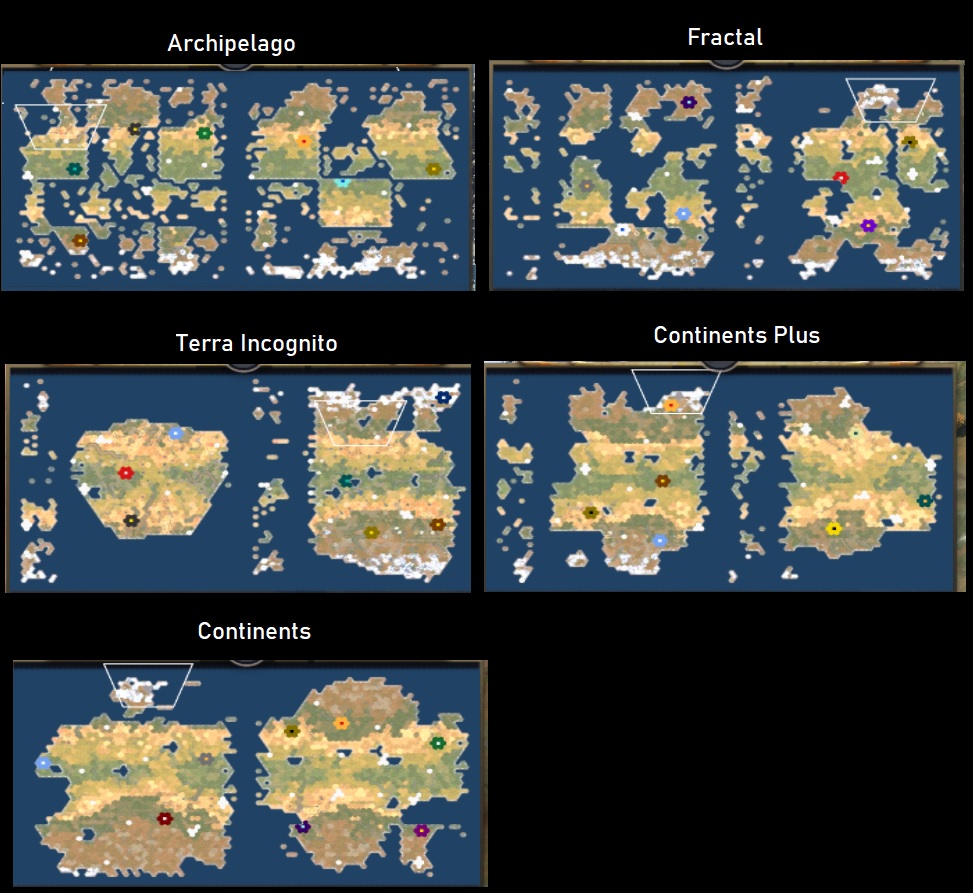
Then there were the map, goodness gracious those Civ7 maps. The game launched with technically six map scripts, however the Shuffle option just randomly picked one of the other scripts so in truth there were only five of them. The other five map scripts are pictured above and, ooof, did these ever fail the test of good design. Most of the scripts generated the same setup over and over again: exactly two continents, no more and no less, with a chain of islands running between them. These continents invariably had a blocky, squarish shape and always placed the same number of AI opponents on each continent, 4 AIs plus the player on the starting continent and the other 3 AIs on the "distant lands" continent. Every time. The Archipelago map only broke up those two main continents into several large chunks, producing shapes that looked absolutely nothing like a real archipelago (note the perfect rectangle island above!), leaving the Fractal map as the only one that could produce any kind of variation at all. These half-baked designs were largely necessary due to the whole "distant lands" concept that dominated the Exploration age (more on this in a minute), but their dull, formulaic nature sucked out much of the charm of starting up a new game. Every new campaign in Civ7 seemed to be playing on the same map so what was the point?
It's also worth mentioning that there were no map sizes larger than Standard available when Civ7 released, none of the Large and Huge maps which are so popular with much of the playerbase. Nor was there any kind of Earth map with true starting locations available, something that's never interested me but also appeals to a huge segment of the community. It goes without saying that there were also few customizable game options to be found on release, little more than the barebones chance to select difficulty level and choose a setting for the natural disasters (which were rampant even on the "Low" setting for some reason). I guess we should be happy that the developers at least allowed players to turn off the Crisis mechanic, something I removed immediately after my first game.
Long story short, Civ7 on release was a skeletal, unfinished product that gave off a terrible first impression. On top of that, the publisher was also asking for an increased price point of $70 for this game, while also selling Day One downloadable content along with two additional special editions of Civ7 which soared all the way up to $125 for the most expensive version. Civ7 therefore had the ugly combination of being a buggy, poorly documented mess of a release while also simultaneously asking for more money than ever before. This nasty pairing led to an immediate negative reaction from the fanbase and gave Civ7 a poor reputation that it's never recovered from. I don't think that Firaxis and Take-Two had any idea how much damage they did to Civ7 by releasing it in this state; they probably assumed that everything would blow over and Civ fans would go right back to purchasing more downloadable content for the next five or six years. Clearly that has not happened and I'm dubious that Civ7 will be able to recover from these initial missteps. Maybe if the game had only suffered from a poor interface things would have been fixable. However, the flaws in Civ7 run much, much deeper than that and there's a reason why the player count and sales haven't improved despite a series of patches cleaning up some of the worst problems with the release version. This was not a game where a poor user interface was holding back an otherwise gem of a title, the flaws ran much deeper than those superficial issues. We need to look at the real problems that have caused Civ7 to bomb so badly with the dedicated Civilization fans.

Civ7 is unlikely ever to experience the success of the prior Civilization games because the core design of the gameplay is fatally flawed. The combination of the legacy scoring and the era transitions have transformed Civ7 into a mere imitation of the gameplay from the traditional series, no longer building an empire to stand the test of time but rather competing in a series of semi-connected minigames. Over and over again, Civ7 forces the player into rigid, railroaded gameplay with the intention that they must do the same things in each game to play the "correct" way. Simultaneously, Civ7 also repeatedly tears down whatever the player has built and attempts to reset the board through the mechanic of the era transitions. This combination has killed the fun factor of the Civilization gameplay for a vast swath of players, most of whom enjoy the Civ games as a sandbox exercise and largely just want to build their empires in peace. I have a long list of complaints with Civ5's gameplay, the empire-building game that didn't want players to build an empire, but critically Civ5 understood what its players wanted and created a fantastically entertaining environment for casual players to have fun messing around in their little sandboxes. Civ7's designers failed to understand how and why Civ fans play these games, and as a result Civ7's gameplay has left almost everyone feeling unsatisfied.
We'll start with the whole concept of legacy scoring goals, the points that the player accumulates in each era for accomplishing tasks in four categories. As mentioned above, this is a common boardgaming concept and I've had lots of fun playing different games that focused on this kind of round-by-round scoring. Ed Beach surely had this idea in mind when his team came up with the legacy scoring and decided to introduce it into Civ7. However, what makes for a good boardgaming concept in 90 minute sessions against several of your human friends turns out to be a horribly bad fit for 20 hour games played against AI opponents while trying to simulate the entire flow of history. To begin with, the legacy scoring goals never change from game to game, making them repetitive and inflexible. This works for a board game against human opponents because the focus is on competing with your friends, not the scoring goals themselves. It doesn't work in much longer games against AI opposition, where it's made even worse because the AI is pathetically bad at achieving many of the scoring goals. They are especially weak at pursuing the Modern era victory goals and it's unclear to me if the AI can actually win the game at all before time simply runs out. This leaves Civ7 with gameplay heavily based around chasing various legacy scoring goals... only to have competitors that can't achieve most of them. It's a bit like running a race where everyone else can't make it out of the starting blocks - not a lot of fun.
On top of this, many of the legacy scoring goals were poorly chosen and don't match up with the traditional metrics of success in a Civ game. Most of the Ancient era scoring goals are solid choices, as expanding to more cities and connecting resources and researching more technologies are all things that a well-played game will be doing anyway. This ceases to be the case in the Exploration age, however, where the legacy scoring goals start rewarding all sorts of illogical stuff, like collecting relics (that otherwise do nothing) and massively emphasizing "distant lands" settlements while granting no rewards at all for expansion on the home continent. These are dumb objectives, the AI doesn't understand how to achieve them, and it's ridiculous to base so much of Civ7's gameplay around them. But even if the legacy scoring goals were better chosen, they would still be a poor mechanic because they force the player into repetitive and boring gameplay. The whole "distant lands" concept is one of the worst ideas anyone has ever introduced into a Civ game, forcing all of the maps to look the same and inexplicably telling the player that they have to engage in colonialism in each game. It's fun to collect 30 treasure fleet resources for the first time, maybe even to do it a couple more times. But collecting those treasure resources in EVERY single game? Civ7 tells the player that they have to do so or else they get no legacy points, and this is the only way to prevent your cities from downgrading back into towns in the next era. There's no choice but to follow Ed Beach's predetermined checklist in every single game or else suffer huge penalties.
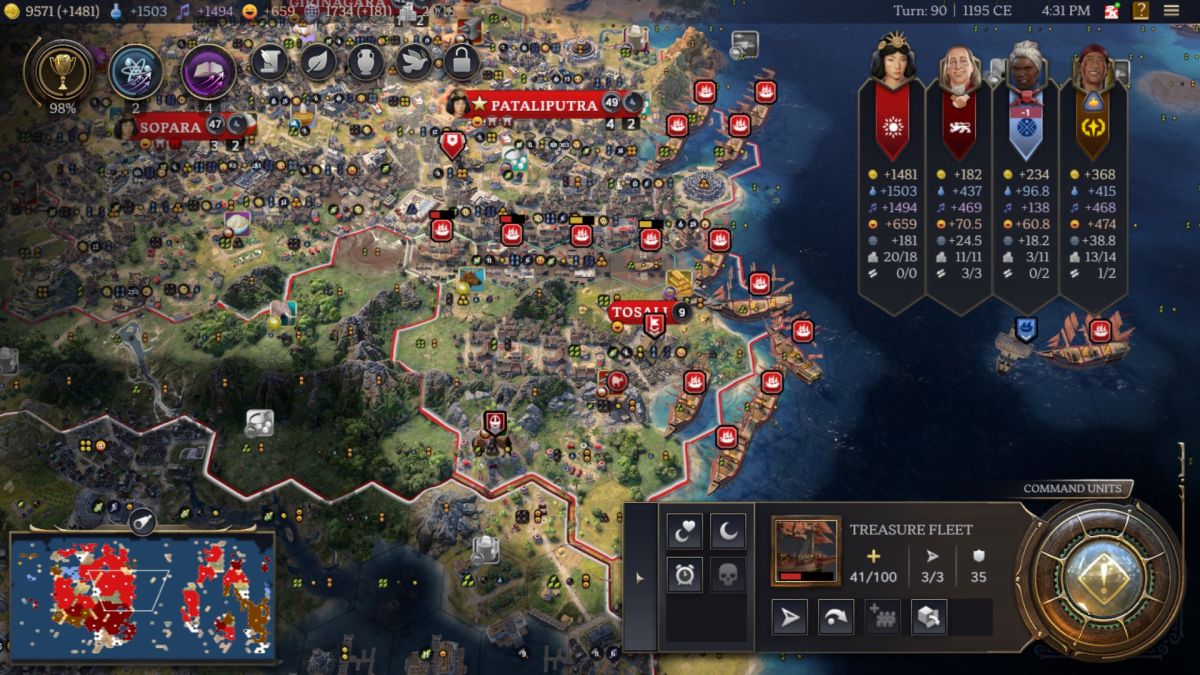
These legacy goals must also be achieved before the era comes to a close, and the eras often end abruptly with little to no warning ahead of time. The percentage-based era meter in the corner of the screen is notoriously unreliable (since it goes up in big jumps when the player or AI civs achieve legacy scoring goals) and this leaves the player with no real idea of when they'll run out of time to finish pursuing their current legacy scoring. This introduces a new concept to the Civ gameplay that few would have wanted in there: time pressure. The player constantly feels like they're "on the clock" and have to hurry before time runs out. For a series that has always been pretty chill in nature, letting players build their empires in whatever way they want, this was not a fun development. I thought this was a good summary of the feeling from poster McSpank01 at CivFanatics:
I totally understand this 'vibe' idea, and it gets at the heart of maybe some of the key issues people are having with the game, myself included. I have always enjoyed the Civ games because they were essentially creative games, they allowed me to let my imagination run wild, create a civ in the way I wanted, be given freedom to play it in the way I wanted, and have the opportunity to make it work no matter what I did. Civ 7 has made it very much 'feel' like that isn't what you are supposed to do now. Legacy paths and victories feel like box ticking exercises, micro games I need to win at. Any game that gives you a numerical goal for something in order to win feels bad. If I am playing an RPG and it tells me I need to kill 20 goblins, that isn't fun; it's work. So when Civ 7 tells me I need to build 7 wonders, make 20 relics or Treasure Fleets, that doesn't feel fun. It also doesn't feel immersive. Was Rome a great empire or civilisation because it created 7 wonders?! On top of that, it's an incredibly passive experience, I don't feel like I need to bother interacting with other civs to win the game, or I am competing against them at all. It still has a terrible interface, it still doesn't explain what things do, and that all leads to this feeling that it is work, not fun. Same thing I keep feeling: constant time pressure to complete objectives, which is great for a board game but does not fit with Civ at all.
"Work, not fun" is the best succinct summary that I could find for this general feeling, thanks for expressing it better than I could. 
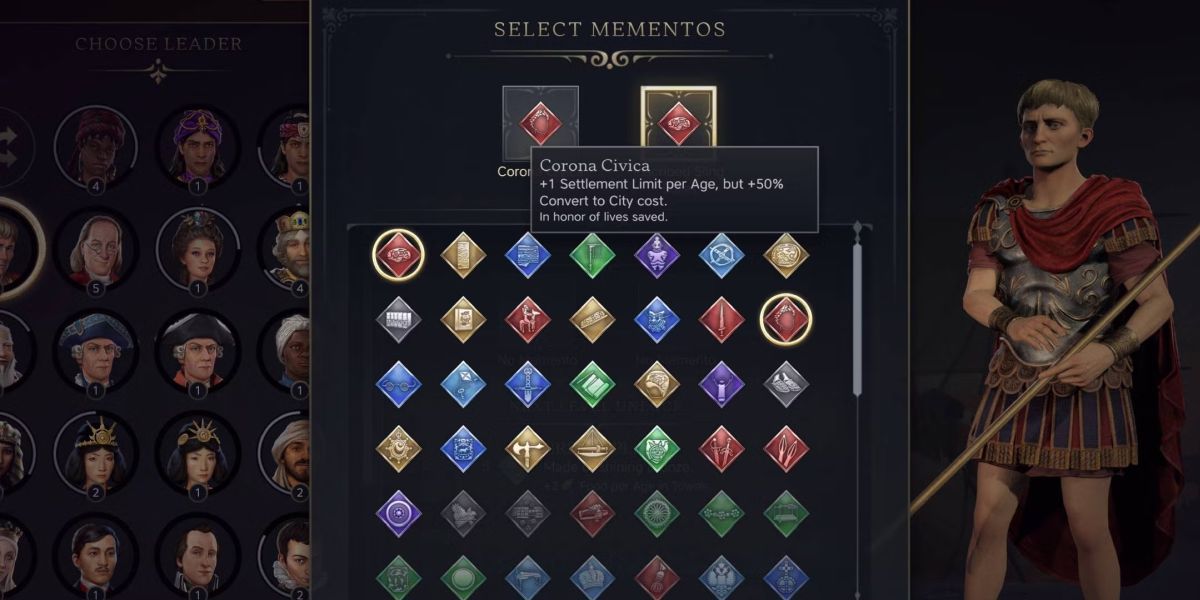
One mechanic that's emblematic of the rigidity in Civ7's gameplay is the new addition of the settlement limit. This is an innate cap placed on the number of settlements that each civ can control, with increasing happiness penalties for each settlement added that goes above this numerical barrier. There are a handful of increases to the settlement limit in each era and then that's it, there's nothing more that the player can do beyond offsetting the stacking happiness penalties. I've found that I can usually push about three settlements above the limit without crashing my happiness but then I'm stuck with nothing further that can be done. It's a frustrating and completely artificial restriction that never existed in any of the previous Civ games. With that in mind, why in the world is there a settlement limit at all in this game? Civ6 had nothing of the sort and it didn't unbalance the gameplay. If Civ7 made settlers slightly more expensive and had them scale upwards in cost like in Civ6 (they do get more expensive in Civ7 but at a slow rate of increase), then the settlement cap could easily be removed entirely. But as with so many other mechanics in Civ7, the designers didn't want the players to expand quickly so they hardcoded the gameplay to rule it out. Thus players will find themselves with roughly the same number of cities, at the same point in each era, over and over again in their games, since that's as much as the settlement limit will allow. This goes a long way towards making the games feel repetitive since the pace of expansion is locked at the same rate with little room for deviation.
I also suspect the settlement limit exists because the developers were concerned about that "snowballing" issue mentioned in the dev diary article. Rather than build an AI who could play the game competitively, the developers instead did their best to reign in the player by strictly limiting how much the player was allowed to expand. This didn't work, of course, since a good human player can still run rings around the pathetic AI, but it certainly did make the game less fun to play. This mechanic was also likely intended to ensure that there would be lots of unclaimed land on the "distant lands" continent for the player to colonize while chasing after those treasure resources. It's a good example of how one poorly designed mechanic (distant lands) bled over into another bad decision. Here's a better idea: how about there are no artificial caps on expansion and the map fills up naturally over time, with everyone competing for territory and resources? That seemed to work pretty well in, oh, every previous Civilization game (Civ5 and its foolish global happiness mechanic excepted).
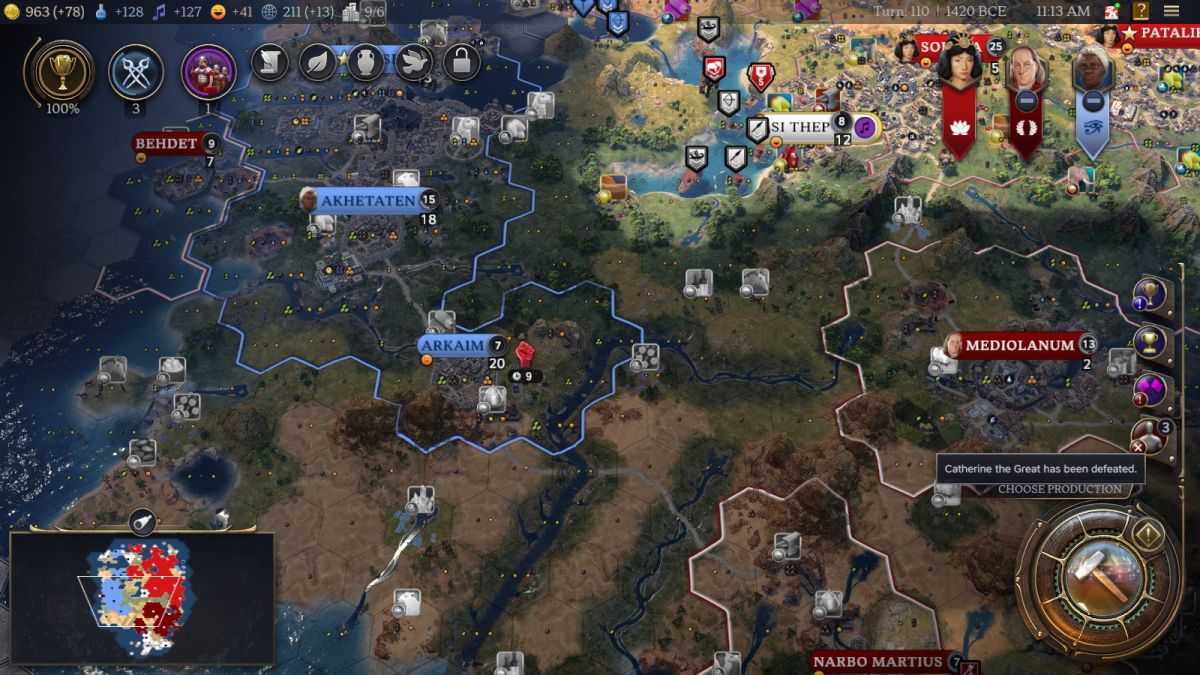
Still, as annoying as the legacy scoring and the settlement limits might be, I think that these mechanics could theoretically be worked around in same fashion. The most recent Civ7 patch has even introduced an option to turn off the legacy scoring altogether, which might be a solution if it weren't for the single biggest issue in Civ7's gameplay: the era transitions. This is arguably the worst mechanic ever added to a Civilization game and it's the core reason why so many people have rejected Civ7. There was a massive outcry when the developers announced that Civ7 would introduce civ switching, with players forced to drop their starting civ and swap to a different one upon reaching each era transition. For many players this was enough to reject Civ7 immediately; no longer would the gameplay let them guide a single civ throughout the whole course of history which was always one of the biggest draws for the series. Now it wouldn't even be possible to start the game as France or Brazil or Australia, only Ancient civs would be allowed in the Ancient era and so on. That might have been good for balancing purposes but it killed a huge amount of the fun factor associated with Civilization. The whole point is getting to live out the historical fantasy of being Gandhi of the Aztecs while building the Great Wall! The developers simply removed this as a possibility and destroyed a tremendous amount of goodwill in the process.
But it wasn't bad enough that the developers forced players to swap civs on each era transition with no chance to stick with their starting choice. No, the era transitions themselves also thoroughly trashed the very civilizations that players had spent the previous age painstakingly building up. This was the anti-snowballing reset mechanic that the developers identified back in that initial dev diary, their best attempt to wipe the board clean and start everyone out from the same point in each era. Thus the era transitions smashed apart the player's progress in a multitude of ways: by default, every city reverted back into a town once again, undoing the gold previously spent to upgrade them. Nearly all of the units from the previous era would be deleted (though players found a way around this by spamming army commanders), with the surviving units teleported to seemingly random parts of the map. It's still completely impossible to carry over any ships from the Ancient to Exploration era, fun stuff. Most of the buildings from the previous era would get the "obsolete" tag and lose nearly all of their yields, thus cratering science and cultural output at the start of each new era. Then the player gets the opportunity to "overbuild" all of their previous buildings with new ones that do the same thing with slightly higher yields. Every city state disappeared off the map to be replaced with new ones, with all previous friendships vanishing, and the diplomacy with the AI empires would mostly be reset back to zero. If you were in the middle of an exciting war, tough luck, the era ends when it ends and you can't do anything about it. Furthermore, no matter where they might have been on the tech and civic trees, everyone would start the next era in exactly the same place from a technological perpsective, thus ensuring no one could ever fall too far behind. Again, the goal was a blank slate with everything starting over again.
Despite all of this, the era transitions didn't work particularly well as a reset mechanic. If the player was crushing the AI civs in the previous era, it was easy to carry that dominance over into the next era as well. What they did achieve was being an incredibly anti-fun mechanic to experience as a player, among the least fun things I can ever remember experiencing in a video game. Hardly anyone wants to spend hundreds of turns developing their civilization only to see their cities downgraded, their units deleted, and their buildings obsoleted - all without any way to prevent it! This would get particularly ridiculous when the player's civ was dominating their opponents, then easily weathered the end-of-era crisis... only to be told that their whole civ burned down offscreen and was replaced with a new one. What in the world was fun about that? The era transitions even bizarrely grew additional population points in my settlements and built rural improvements on random tiles without asking me as a player. The single best analogy is that the era transitions felt like someone else grabbed the keyboard and played your game for a little while, then handed it back after wrecking everything and forced you to pick up the pieces. I can remember my younger brother doing that a few times when he was about 6 years old but I can't say that it's an experience I wanted to have recreated in my Civ games.
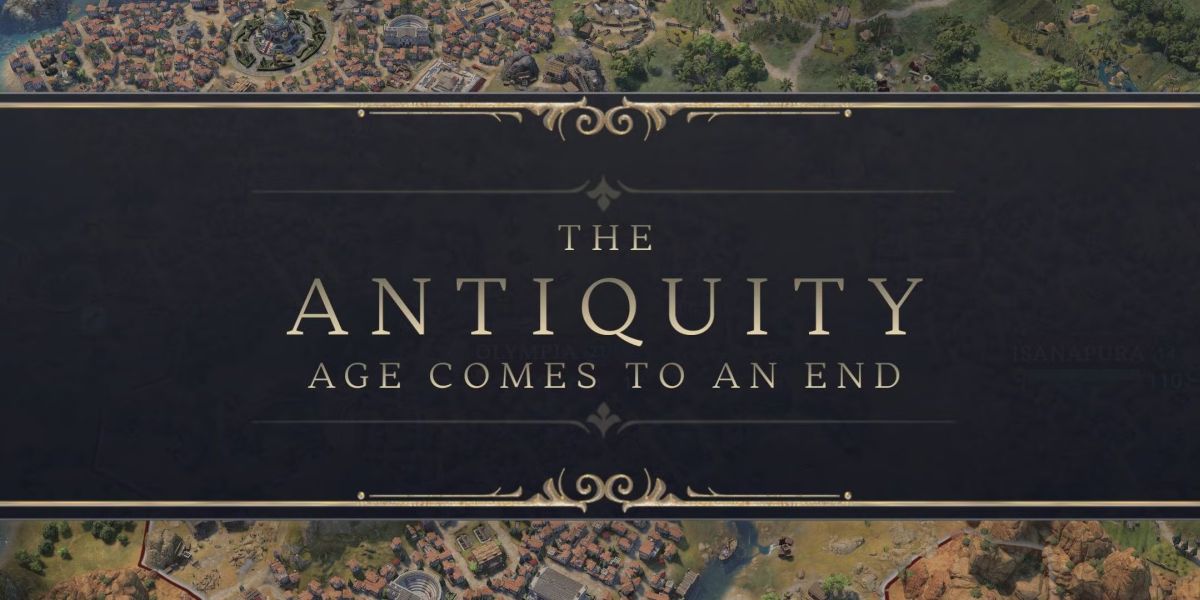
I saw these sentiments echoed in a lot of places online, with the best short summary coming from Reddit poster Iamamancalledrobert:
I'm not optimistic - definitely there are people who like this, but I'm not sure the demographic will ever be large enough for the game to be successful. To me, the main issue it faces is that it's built around a model that involves taking things away from the player in a way which gives them no agency, and that this may be too big a problem for too many people. It reminds me a bit of how Magic cards moved away from "downside" mechanics, that give you something strong at a heavy cost. Some people found them fun and strategic; they're still a part of the game. But enough people found being forced to harm themselves miserable enough that it became a much smaller part of it. They wouldn't base a whole set around downside mechanics any more: people see the negative costs, then feel negative about the cards they are associated with.
I don't know if Civ 7 can get around that its selling point is based on destroying what players have built. You can say "actually, there are loads of cool things which happen when you do this!" Maybe there are, although I doubt I'd ever find them especially cool. But the downside is the thing which leaves the impression; the game is based on taking things away in a way that I expect will limit its appeal. And this is a mechanically fundamental issue, which it doesn't seem the team believe to be an issue at all. Maybe there will be people who like it a lot, and that's nice for them. As a commercial product, I think it is probably doomed.
This was another case of someone else summarizing the issue better than I could myself: Civ7's gameplay is fundamentally based around taking things away from the player. And while there are a handful of people who either enjoy or don't mind this sort of thing, a large majority of players clearly find it frustrating. This is a mechanic that never, ever should have found its way into Civ7's gameplay because it blatantly contradicts why the overwhelming majority of people play these games. Most players develop a strong attachment to the civ that they build and the last thing that they want is to see it torn apart, not because they failed to develop their economy or couldn't prevent a hostile invasion, but because a little clock in the corner of the screen arbitrarily decided that it was time for their empire to collapse. I believe that the era transition gameplay concept is a complete dead end from a design perspective, something that players detest while also failing to achieve any of its intended goals. Age-based resets are inherently something that can't be balanced properly: set the reset mechanics too low and the whole thing is pointless as the strong remain strong and the weak remain weak. Set the reset mechanics too high and things are arguably even worse, with everything that happened in the previous era becoming completely meaningless because the playing board has been flipped over. Civ7 sits somewhere in the middle of those extremes, trying to thread the needle on the age reset while satisfying absolutely no one. This is a bad, bad idea that never should have been attempted.
Therefore my conclusion is that it's *NOT* the civ swapping that has caused so much unhappiness with Civ7 though that's a convenient shorthand for the larger problem. I think that most players would have been OK with Civ7 if it had presented the choice of swapping (or not swapping!) to a new civ at two points during the gameplay while otherwise leaving everything alone. If there was the option for civ swapping without the massive disruptions associated with the era transitions, I think this concept would have been received favorably. So no, it's not the civ swapping, it's the era transitions that wreck the gameplay in Civ7. It's the gameplay based around "taking things away from the player", tearing down their buildings and deleting their units, which is causing players to uninstall this game and move on to other strategy titles. For Civ7 to fix its gameplay, the era transitions need to be destroyed. It's the only way that I can see this game reaching the popularity of its predecessors because the current mechanics are hated so badly by most of the traditional Civ fanbase. On that note, let's try to conclude with something more positive:

If I were tasked with fixing Civ7, I would focus on revamping the entire gameplay to create an "ageless" or "classic" mode that more closely resembled the prior games in the series. First and most importantly, I would completely ditch the legacy scoring and the era transitions. The legacy scoring goals simply do not fit the concept of building an empire that runs across the entirely of human history while the era transitions as reset buttons run contrary to the whole raison d'etre of the Civilization series. That's not to say that there can't be ages in Civilization games, since Civ3 and Civ6 both featured eras rather prominently in their respective designs, only that the way that ages were implemented in Civ7 was absolutely the wrong way to go about this concept. It's a bad idea to take things away from players, and an even worse idea to do it without giving them tools to stop the loss. We won't be doing any of that in our Civ7 revamp.
The basic idea behind creating an ageless mode would be removing that whole feeling of loss. Every building would simply get the "ageless" tag that currently applies only to unique districts and the warehouse buildings, ensuring that their yields would remain the same for the whole game. Quarters could be modified so that more buildings could stack together over time on the same tile, starting at the current 2 in the old Ancient era and then expanding to 3 and then 4 buildings in a quarter by the end of the gameplay. This would keep the map from being overly crowded by having all buildings retain their usefulness for the whole game and allow players to add more structures in spots with juicy adjacency bonuses over time. (I think this would be way more fun than the current system that forces players to bulldoze their old buildings for new ones if they want to keep using the best adjacency spots.) All buildings from the earlier parts of the gameplay would always remain buildable, as in past Civ games, so newer cities could quickly get up to speed with the higher yields in the lategame. Costs for techs and civics and so on would have to be rebalanced without anything being obsoleted but that shouldn't be too hard to do. The current system balanced around ripping apart the player's progress at the end of each era is a much, much worse concept.
Eras would technically still exist but without any transitions involved. Upon reaching the end of the tech or civics tree in the Ancient era, the player could go back and research more masteries or simply continue onwards into the next tree in the next era. This is essentially how the tech tree worked in Civ3 and the interface in Civ7 can already accomodate multiple civics trees in each era so in theory this wouldn't be too complicated to implement. Units could upgrade into their next tier equivalent, like horsemen becoming coursers, without anything getting deleted or teleported around the map. No one would magically catch up in techs either and it would be possible for civs to fall far behind if they were playing poorly. Independent powers would stay for the whole game without appearing and disappearing from the map, and they would ally with whoever had the most influence accumulated with them at the present moment. This would create opportunities for different empires to catch up to and pass the prior suzerain, much like in Civ6, rather than the idiotic current system where the whole process ends once anyone hits 60 influence points. The ageless mode design would also maintain pantheons and religious beliefs for the whole game instead of abandoning them at the end of each era, something that might make religion more than an afterthought in the gameplay. And the whole settlement limit concept could be ditched altogether, since there's no reason for it to exist as long as it was paired with giving the AI civs a kick in the pants to expand at roughly double their current sad rate.
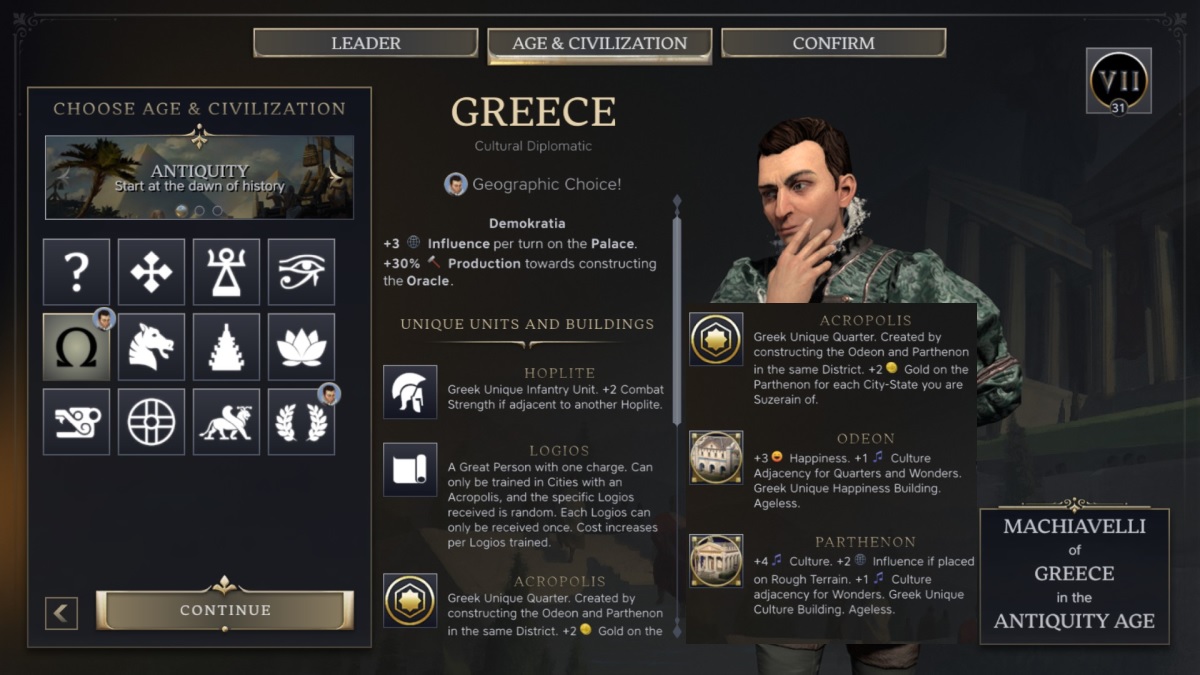
Civ swapping would exist but crucially as an option, not as a forced mechanic. Upon finishing the initial tech or civics tree, the player would be prompted with the option to swap to a new civ associated with the second era. This would unlock their unique units, buildings, civics, etc. as research options to unlock over the course of the second era. It would absolutely not be required though as the player could opt to continue right along with their original civ choice, along with some kind of small bonus to compensate them for giving up the uniques associated with a new civ. My best suggestion here would be to award extra influence for a civ that passed up the chance to swap, maybe 25% more influence from all sources when passing up once and 50% more influence when passing up twice. Influence is the hardest of the major currencies to get in Civ7 and it would make sense that a Roman or Han Chinese civ that stuck around into the final era would have a tremendous amount of international prestige by virtue of its great age. I could see that being attractive enough as a reward that it wouldn't be a pure variant choice to keep the same civ around. There would also be no limits on which civs could be played at which times: if you want to start the game as Mexico and not get your uniques until the third era, go right ahead and do it. The Civ7 designers were so busy trying to save everyone from making the "wrong" choices that they cut all of the fun out of playing these setups.
None of this seems like it would be THAT difficult to implement, given that everything I've described already exists in Civ7's gameplay. For that matter, they've already created an option to turn off the legacy scoring goals though that doesn't really achieve anything so long as the era transitions remain in place. Basically the developers would have to strip out the era transitions and then rebalance the rest of the gameplay around their removal, a tricky task to be sure while being far from impossible. Now do I think that we're likely to see anything along these lines? Almost certainly not as the split into three ages and the era transitions associated with them are absolutely core to the current design structure of Civ7. I've looked at the Civ7 file structure and it's pretty wild how they're organized: Civ7 is literally coded as three entirely separate games with a handful of mechanics connecting them together. This is why the transitions are so rough, because Civ7 is literally shutting down one of those games and then loading an entirely new game when the next era begins. This unfortunate decision of how to structure the game's coding makes the concept of an ageless mode significantly harder to implement. Furthermore, abandoning the whole concept of ages would mean admitting that the entire premise of Civ7 was a failure and I don't see the developers being willing to do that. More likely, they'll try to polish around the edges without tackling the real problems buried deep into the structure of the design.

While we're being proactive here, let me also outline how I would approach the same criticisms of the traditional Civilization gameplay identified by Ed Beach's team. Recall that they saw snowballing, excessive micromanagement, and civ balance as being problems that they wanted to address, with these problems causing too many Civ players to abandon games without finishing them. While I agree that these are indeed problems with the Civ series, Civ7's attempted solution of setting up smaller minigames and resetting the gamestate with destructive forced era transitions was about the worse response possible. The problem is not that Civilization games snowball over time - that's inherent to the genre and trying to stop it won't work - the problem is that Civilization games need to recognize when a game is over and allow the winning side to cash out with a quick victory. That right there is the whole solution: design mechanics that allow players to wrap up games that are already won without having to play out hundreds of turns of a foregone conclusion. The classic example of this is Master of Orion with its Council victory, which is still exceptionally good at recognizing when the player has reached a winning position and letting them end the game there. There's no reason why Civilization can't have a version of this too! When 70% of the map has been settled, the Global Council starts meeting periodically and anyone who gets 2/3rds of all population in votes is the winner. Very simple to understand and a fast way to wrap up lots of games.
I'd also have an option for players to turn on "alternate victories" as a game mode. These would be victory conditions that kick in whenever one empire gets ludicrously far ahead of the rest of the field, for example if someone is producing 5x more science than anyone else in the world, that's the alternate science victory condition right there. Anyone that far ahead in tech is clearly going to win, so why not let them cash out their victory and move on to the next game if they want? There is no point in making someone research 50 more techs to launch the spaceship if they're getting 1000 beakers/turn and no one else can crack 200 beakers/turn. Similarly, you could have the same alternate victory condition for culture, or territory (if anyone has 50% of land area or population they simply win), or influence if someone controls 80% of more of the city states, etc. There should be several of these that stand alongside the traditional victory conditions and allow the game to end without to research every tech and civic and so on. Obviously this would all be optional and players could reject the alternate victories in favor of the more traditional ones, but this is how you solve the problems identified by the developers. You don't try to fight against snowballing in a Civilization game, which is like fighting against the incoming tide, you allow games that have snowballed to a clear victory to end quickly and decisively. The Civ7 developers identified the correct problems but were cataclysmically wrong in their solutions.

Even after all of this discussion, I still find myself asking the most basic question about Civ7's overall design: why? Why did they think that players would enjoy the age resets and the era transitions? It's impossible to avoid the conclusion that Civ7's development was heavily influenced by Humankind which also featured the concept of swapping between different civilizations in each new age. Civ7's developers have claimed that they came up with the idea of ages and civ swapping independently, however that seems extremely unlikely to me. Humankind was the biggest direct competitor to the Civilization series in the last decade, an impending threat that Firaxis had to have known was coming down the pipeline and seems to have sparked a panicked imitation. Ironically, Civ7 would have been far better off by ignoring Humankind completely rather than trying to imitate it. Humankind was a huge flop as players rejected its gameplay for being technically proficient but souless to play in practice, feeling more like piloting a spreadsheet than leading a true nation. It was enough of a disaster that developer Amplitude Studios cut ties with their publisher so that they could return to being a completely independent development studio and never have to make another Humankind sequel. Civ7 seems to have thought that this was the hot new commodity, dipped its toes in the same waters, and then ended up getting burned just as badly. Civ swapping simply doesn't appear to be a good fit for empire-building strategy games.
The other, more sinister motivation for creating the era transitions probably stemmed from a desire to sell even more downloadable content. Rather than having to create a leader and civ together as in past Civ games, now Firaxis could sell them off individually for even more sweet DLC revenue. I'm sure that the publishers had visions of dollar signs dancing in their eyes as they expected to sell dozens of civs and leaders in separate chunks over the next half a dozen years. But their greed seems to have caught up to them this time as the DLC sales have to be far below expectations given how few people are playing Civ7 at the moment. If they were expecting Civ7 to be a big cash cow for the rest of the 2020s, they're in for a rude awakening. At every step of the process Civ7's developers fundamentally misunderstood their product and their fans, leaving the game with an uncertain future at this point.
Can Civ7 recover from these disastrous first few months? While it's not impossible, my experience has been that it's exceedingly difficult for a game to change opinions on a large scale once the narrative has set in. And make no mistake, the narrative in the wider gaming public is very much "Civ7 is a bad game" at the moment, with its horrendous user reviews and toxically bad word-of-mouth feedback. Worst of all, Civ7 seems to have dropped out of the public perception entirely outside of the niche turn-based strategy game community. No one is talking about this game, hardly anyone seems to be playing this game, it's just a big void at a time when Civ7 should be at the height of its popularity. There's an old saying that there's no such thing as bad publicity, and while I'm not sure that I fully agree with that, it's true that the worst possible fate for Civ7 might just be for everyone to forget that it exists at all. 



